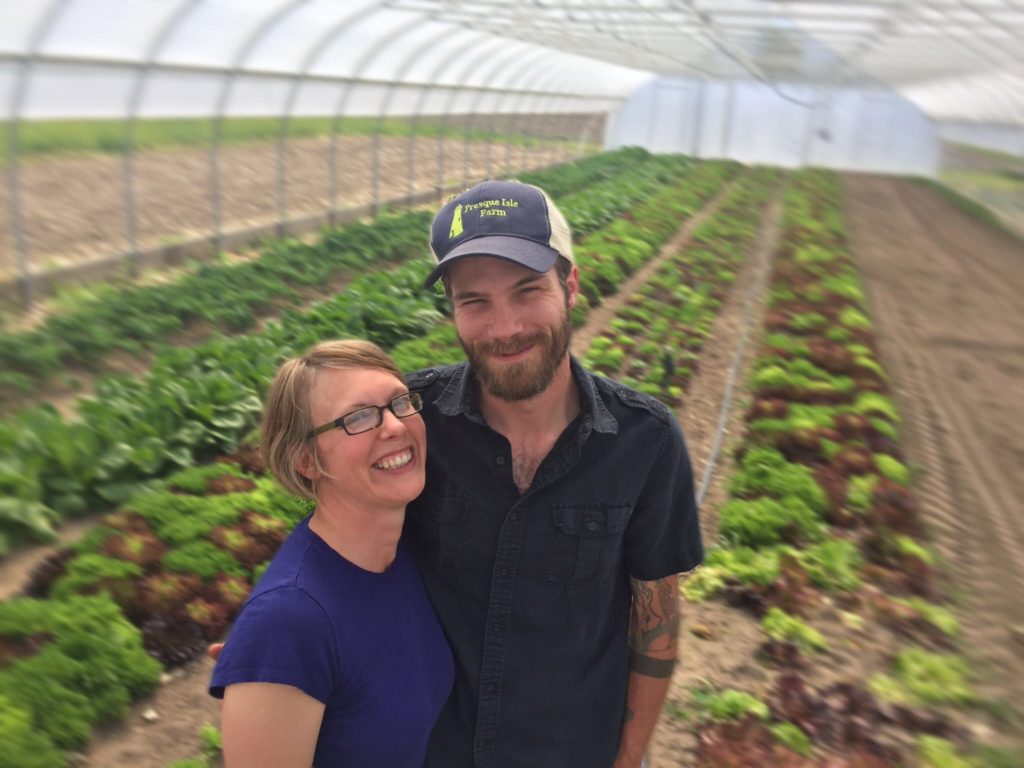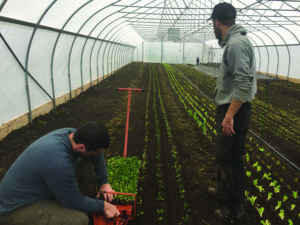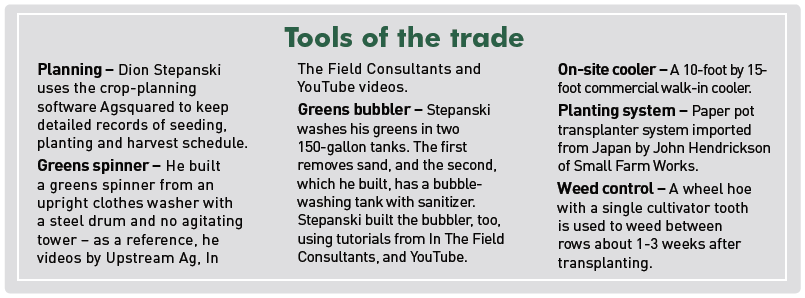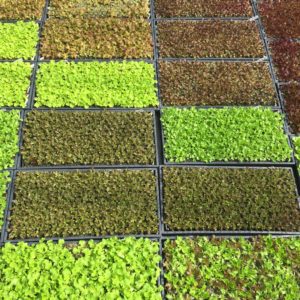

Apr 3, 2018Greens grower builds on shared wisdom of small farms
A small farm in Presque Isle, Michigan shows the organization and expertise available to a new farmer not afraid to seek out advice and try new techniques.
Dion Stepanski of Presque Isle Farm spoke about salad mix production systems at the Great Lakes Fruit, Vegetable & Farm Market EXPO in Grand Rapids. Although his farm is relatively young, he highlighted a number of best practices he’s adopted from other growers.
“Everyone else’s success has led to us being able to adopt their good systems,” Stepanski said in an interview after his presentation. “There’s a lot of transparency in the small farm community right now. In the past, I think it happened on a more local level. Now, I think it’s happening online.”
A 40-acre centennial farm had been in his family for six generations.
“My grandmother and great-grandmother lived there when I was young until my father took it over,” he said.
“He had a small hobby farm and petting zoo. My great-grandfather was the last to farm the land with a small cattle operation.”
Stepanski took over the property in 2014 and turned a former cattle pasture on the site into a vegetable farm. He’s farming just 1.5 acres of property with three 30-foot by 90-foot high tunnels, or less than 9,000 square feet, under tunnels.
Two of the hoop houses were financed though Hoophouses for Health, a Michigan program that provides capital for farmers to build hoop houses to extend the growing season throughout the state while improving access to Michigan agricultural products for children and other populations deemed “vulnerable” by the program.
“We pay off the loan in the form of food that we offer to Posen and Rogers City schools,” Stepanski said.
It’s a small farm, and the workforce is small – last year, Stepanski worked only with his wife, Molly, and a part-time intern. Still, the farm was productive last year, pumping out 4,000 pounds of lettuce mix – 70 to 250 pounds per week, with an average of about 120 pounds per week. They managed to have a product available for nearly nine months, from April to December.
Being a new operation that already followed organic processes, getting the organic certification was straightforward, “just a matter of keeping good records.”


Some help from friends
Stepanski wasn’t shy about talking to other small farm growers. First-generation grower Brian Bates of Bear Creek Organic Farm near Petoskey, Michigan, shared quite a bit of production information and insight into using a paper pot planting system.
Stepanski also worked with Michigan State University Extension Small Farm Educator Collin Thompson to troubleshoot pest or disease issues, which are often difficult to manage in an organic system.
“His attention to detail and willingness to explore and try new approaches continues to be a large part of the success of Presque Isle Farm,” Thompson said. “Dion has developed a strong brand that is synonymous with quality and consistency. This is of particular importance when developing a healthy local food system – we need to be able to not only rival, but outcompete national suppliers when it comes to quality. Dion has worked tirelessly to make this the mission of Presque Isle Farm.”
Stepanski also gathered information from other growers using the internet. After watching YouTube videos of what other growers had done, he built an improvised greens spinner from a stainless-steel washing machine and a plastic greens bubbler.
“I’m not claiming credit for any of those,” he said. “We are just adopting efficient systems already in use.”


Stepanski is an avid listener of Chris Blanchard’s Farmer-to- Farmer podcast, where growers around the country are interviewed in depth about their farms, business operations and cultivation techniques. He’s also booked up, reading works like Ben Hartman’s “The Lean Farm: Guide to Growing Vegetables,” and Curtis Stone’s “The Urban Farmer.” The trend for smaller farms tends to be towards simple and easy-to-use operations, Stepanski said.
Honing in
“I don’t feel like we are setting the trend on what is cutting edge. We are following other farms and modeling the systems that are working for others,” Stepanski said. “That being said, we really have honed in our lettuce production system.”
Presque Isle Farm grows a mix of red and green-leaf lettuces, including Salanova varieties from Johnny’s Selected Seeds — Green Incised, Green Sweet Crisp, Red Incised, Red Sweet Crisp, Red Butter – and one-cut lettuce varieties from High Mowing Seed – Buckley, Hampton, Ezrilla, Brentwood and Ezbruke.
“We kind of always are adjusting what we want in the mix,” Stepanski said. Seed itself is mixed prior to planting in order to keep the mix uniform throughout the process and increase the efficiency of harvest and postharvest washing and packing.
The collective help of the small farm community – in Michigan and across the Internet — has enabled the new grower to get off to a good start. Stepanski hopes to add a fourth hoop house in the coming season.
“Everyone else’s success has led to us being able to adopt their good systems,” he said.
– Stephen Kloosterman, Assistant Editor
Above: Husband and wife, Dion and Molly Stepanski, run Presque Isle Farm in northeast Michigan, with very little outside labor, but lots of advice from other small-farm growers. Photos: Presque Isle Farms















